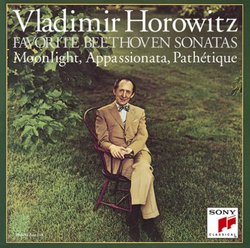| All Artists: Vladimir Horowitz Title: Beethoven: Moonlight/Pathetique/Appassionata Members Wishing: 0 Total Copies: 0 Label: Sony Japan Release Date: 11/19/2008 Album Type: Import Genre: Classical Style: Number of Discs: 1 SwapaCD Credits: 1 UPC: 4547366040180 |
Search - Vladimir Horowitz :: Beethoven: Moonlight/Pathetique/Appassionata
CD DetailsSimilar CDs
|
CD ReviewsClose, but no Cigar Hank Drake | Cleveland, OH United States | 03/23/2010 (4 out of 5 stars) "This CD features the Vladimir Horowitz performing three of Beethoven's most popular "named" sonatas. It's no secret that Horowitz did not care for Beethoven's clumsy piano writing, was not regarded as a great Beethoven interpreter, and recorded these sonatas mostly to satisfy contractual obligations. Though these sonatas were recorded in 1963 and 1972, Horowitz never played these particular works in public after 1953.
This is Horowitz's third recording of the de-rigueur Moonlight. As a performance, it is smoothed out and uneventful, slick and modern--even cold. The triplets of the opening movement lope along without having much meaning invested in them (a far cry from Horowitz's 1956 recording of the work which, despite its poor sonics, remains a benchmark in Beethoven performances). The Allegretto has some nice voicing, but the Finale's sudden accents are ignored, robbing the movement of much of its drama. One can admire the clarity of the playing here, as well as the technical finesse and excellent recorded sound, but Horowitz's heart is clearly not in this performance. Beethoven's Pathétique (the only Sonata named by Beethoven himself) was composed before the Moonlight but is programmed after it on this CD. This version of the Pathétique contains some of Horowitz's best Beethoven playing, with a perfectly paced opening movement, a beautifully weighted Andante, and an unrushed Finale. It is the best performance on this CD. Horowitz was more attuned to the bravura Sonata in F minor, Op. 57, the popular Appassionata. This 1972 recording is more successful than his more somber 1959 version. Horowitz allows more of his innate theatricality to come through, thereby increasing the drama of the piece. He also resists the temptation to stress the odd phrase for effect, at the expense of the whole, thereby increasing the structural cohesiveness. Especially noteworthy is the finale, taken at an unhurried tempo (it's actually easier to rush this movement), with virtually no pedal, but with overwhelming effect. Truly this is a triumph of the will over the limits of the flesh. In short, I would recommend Rudolf Serkin in the Moonlight and Appassionata, but Horowitz's version of the Pathetique is excellent." |



